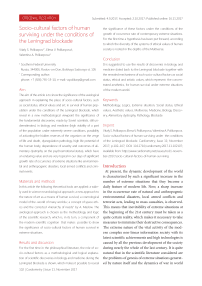Socio-cultural factors of human surviving under the conditions of the Leningrad blockade
Автор: Polikarpov Vitaly S., Polikarpova Elena V., Polikarpova Valentina V.
Журнал: Cardiometry @cardiometry
Рубрика: Original research
Статья в выпуске: 11, 2017 года.
Бесплатный доступ
Aim The aim of the article is to show the significance of the axiological approach in explaining the place of socio-cultural factors, such as social status, ethical values and art, in survival of human population under the conditions of the Leningrad blockade, which reveal in a new methodological viewpoint the significance of the fundamental discoveries, made by Soviet scientists, still underestimated, in biology and medicine (high viability of a part of the population under extremely severe conditions, possibility of activating the hidden reserves of the organism on the verge of life and death, dysregulation pathology, high life potential of the human body, dependence of severity and outcomes of alimentary dystrophy on the psychoemotional status), which have an enduring value and are very topical in our days of significant growth rate of occurrence of extreme situations like environmental and anthropogenic disasters, local armed conflicts and criminal events. Materials and methods In this article the following theoretical tools are applied: a widely used in science neurobiological approach; a new approach to the nature of art as a means of human survival; a cosmological model of the «world of many worlds»; a concept of space ethics and the corrected «hierarchy of needs” by A...
Methodology, logics, multiverse, alimentary dystrophy, pathology, blockade
Короткий адрес: https://sciup.org/148308828
IDR: 148308828 | DOI: 10.12710/cardiometry.2017.11.102107
Список литературы Socio-cultural factors of human surviving under the conditions of the Leningrad blockade
- Bivor E. The Second World War. Moscow: KoLibri, Azbuka-Atticus. 2014. 992p.
- Simonenko V.B., Magaeva S.V. The Leningrad blockade: discoveries in biology and medicine. Мos.: ICM. 2016. 256p.
- Bidlack R, Lomagin N, Schwartz M. (Book) The Leningrad Blockade, 1941-1944: A New Documentary History from the Soviet Archives 2012, Pages 1-487.
- Peri A. Revisiting the past: History and historical memory during the leningrad blockade. Soviet and Post Soviet Review. 2011;38(2):105-29.
- Kureeva IA. The corpses were not picked up for months: A childhood in the Besieged City. Osteuropa. August-September 2011;61(8-9): 91-100.
- Rock D. Brain. Instructions for use: how to use your capabilities to the maximum and without overloads. Moscow: Alpina Publisher. 2015. 374p.
- Carter R. Mapping The Mind. Mos.: АСТ, Corp. 2014. 224p
- Polikarpova VA. Genetic engineering and human problems: hopes and threats. Spb-R-n-D-Tag.: SFU Pub. 1999. 128p.
- Shanzhe ZP. Neurophysiologist view on ethics foundations. Human being. 1999;5,6.
- Satle S, Lilienfild S. Neuromania. How we lose our mind in the epoch of the brain science golden age. Moscow: "E" Publishing, 2016. 368p.
- Blackbern S. Ethics: brief introduction. Moscow. 2007.
- Schweitzer А. Reverence for life. Moscow. 1992.
- Kunin EV. Logics of a chance. On nature and occurrence of biological evolution. Moscow. 2014.
- Chyzhevsky AL. Cosmic pulse of life: The Earth in the arms of the Sun. Heliotoraxia. Mos.: Mysl'. 1995. 766p.
- Adamovich А. The Blockade book. Moscow.2014.
- Yarovoy SV. Blockade ethics. Conception of morality in Leningrad during 1941-1942. Moscow. 2012.
- Atl. of World Art. Ed. by John Onias. Mos.: AST, Ast., 2007. 352p


